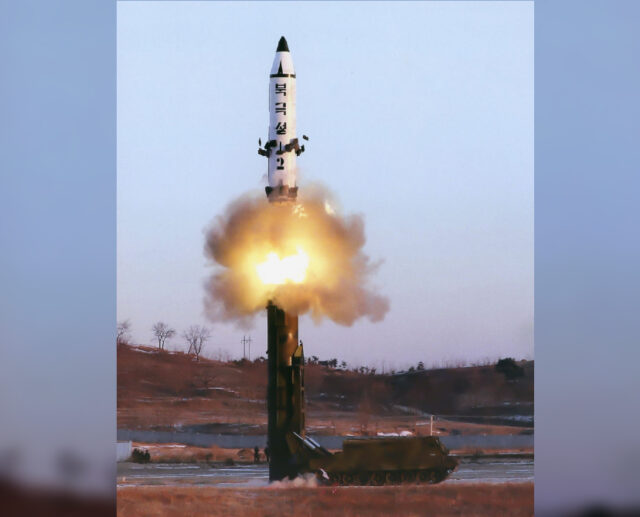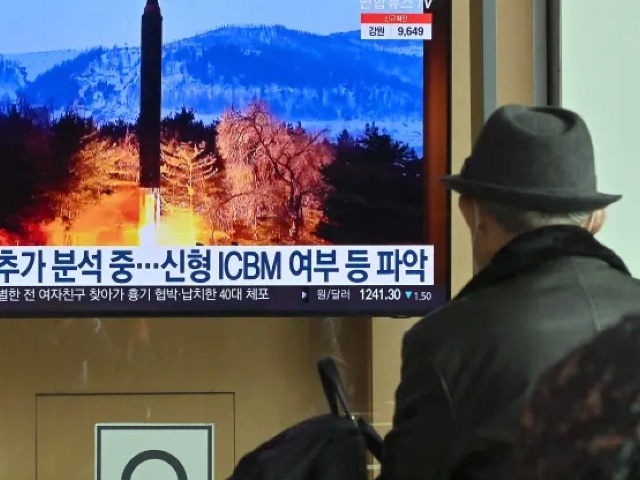U.S. Defense Secretary Lloyd Austin and his South Korean counterpart, Lee Jong-sup, held a joint press conference on Thursday in which they warned North Korea that using nuclear weapons would spell “the end of the Kim regime.”
The unusually stern warning came a day after North Korea launched an unprecedented barrage of 23 ballistic missiles and hundreds of artillery shells, followed by a smaller round of launches on Thursday that appears to have included an intercontinental ballistic missile (ICBM).
According to South Korean intelligence reports, the ICBM experienced a technical failure in flight, coming down somewhere in or near the Sea of Japan. Japanese officials believe some debris from the ICBM may have passed through Japanese airspace.
North Korea conducted these provocative missile launches after denouncing U.S.-South Korean air force exercises and demanding they stop immediately.
U.S. Deputy Secretary of State Wendy Sherman and South Korean Vice Foreign Minister Cho Hyun-dong condemned North Korea’s missile launches as “deplorable” and “immoral” during a telephone conference on Thursday. Austin and Lee went further by threatening dire consequences if North Korea continues to escalate tensions.
“Any nuclear attack against the United States or its allies and partners, including the use of non-strategic nuclear weapons, is unacceptable and will result in the end of the Kim regime,” Austin and Lee declared.
Austin was especially critical of the North Korean ICBM launch, which he condemned as “illegal and destabilizing.”
Austin said that instead of bowing to Pyongyang’s demands to cancel the Vigilant Storm aerial exercises, the U.S. and South Korea would “extend” them for at least two more days. He described Vigilant Storm as “one of the largest exercises we’ve seen in recent history,” involving over 240 aircraft and “high-end types of training events.”
Lee said he and Austin will “work on response options towards all possible nuclear use scenarios by the DPRK,” using the North Korean regime’s preferred name for itself.
“Along with the efforts of the alliance to deter and respond to DPRK nuclear threats, Secretary Austin and I pledged to encourage DPRK to choose denuclearization and the path for a brighter future. We also pledged to continue our cooperation to achieve a complete denuclearization of North Korea,” Lee said.
Lee added that the South Korean government is not currently “thinking to redeploy tactical nukes on the Korean Peninsula.” Austin also said “no new deployment of strategic assets on a permanent basis” is underway.
South Korea scrambled fighter jets on Friday after 180 North Korean military flights were detected near the Military Demarcation Line, the virtual border beyond which South Korea would consider itself under attack.
The massive South Korean response involved at least 80 aircraft, including state-of-the-art F-35A stealth fighters on top of the 240 planes that continued participating in Vigilant Storm.
The United States on Friday called for a public meeting of the U.N. Security Council to discuss Pyongyang’s missile launches. The U.K., France, Albania, Ireland, and Norway reportedly supported the request.
“We strongly condemn North Korea’s test of an Intercontinental ballistic missile, which undermines the global nonproliferation regime and violates multiple UN Security Council resolutions. We call on North Korea to immediately cease its destabilizing actions,” U.S. Ambassador to the United Nations Linda Thomas-Greenfield said on Thursday.


COMMENTS
Please let us know if you're having issues with commenting.